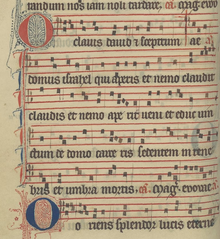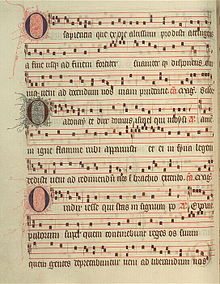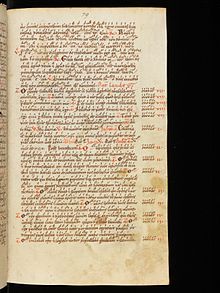O Antiphons

The O Antiphons (also known as the Great Advent Antiphons or Great Os) are Magnificat antiphons used at Vespers on the last seven days of Advent in Western Christian traditions.[1] They likely date to sixth-century Italy, when Boethius refers to the text in The Consolation of Philosophy.[2] They subsequently became one of the key musical features of the days leading up to Christmas.[3]
In the English-speaking world they are best known in their amalgamated form as the hymn "O Come, O Come, Emmanuel".[4]
Sequence
[edit]Each text, in the original Latin, begins with the vocative particle "O". Each antiphon is a title of Christ, one of his attributes mentioned in Scripture. They are:
- 17 December: O Sapientia (O Wisdom)
- 18 December: O Adonai
- 19 December: O Radix Jesse (O Root of Jesse)
- 20 December: O Clavis David (O Key of David)
- 21 December: O Oriens (O Dawn of the East)
- 22 December: O Rex Gentium (O King of the Nations)
- 23 December: O Emmanuel
In the Roman rite, the O Antiphons are sung or recited for the Magnificat at Vespers from 17 December to 23 December.
Origin
[edit]The antiphon texts are believed to have originated in Italy in or before the sixth century.[1] Boethius's Consolation of Philosophy includes a passage in which Lady Philosophy appears to cite the series:
Est igitur summum, inquit, bonum quod regit cuncta fortiter suauiterque disponit. |
He is the highest good, she said, that rules all things mightily and delightfully arranges them. |
The underlying reference is to Wisdom 8:1,[5] but the precise phrasing almost certainly refers to O sapientia.[2]
There were many later traditions throughout the Middle Ages surrounding their performance, and Amalarius wrote a detailed commentary on them in the ninth century.[1]
The first letters of the titles, from last to first, appear to form a Latin acrostic, Ero cras, meaning 'Tomorrow, I will be [there]', mirroring the theme of the antiphons. This is formed from the first letter of each title – Emmanuel, Rex, Oriens, Clavis, Radix, Adonai, Sapientia. Such acrostics were popular among early medieval writers, and some scholars have taken this as further evidence for their antiquity, but this view is not universally accepted.[3][1]

A number of other antiphons were found in various medieval breviaries.[6]
Analysis
[edit]Each antiphon has the following structure:
- a Messianic title preceded by "O". Example: "O Wisdom"
- elaboration of the title: "coming forth from the mouth of the Most High, reaching from one end to the other, mightily and sweetly ordering all things"
- the verb "come"
- elaboration of the request to come: "and teach us the way of prudence."
Below is the traditional Latin text of each antiphon, as well as the English text from the Church of England's Common Worship liturgy.
Each antiphon is a cento of passages from the Bible. In the text of each antiphon below, the passages from the Bible are indicated by underlining, and the quotation in the footnote is from the Vulgate (for Latin passages) or (for English passages) the NRSV unless indicated otherwise.

O Adonai
[edit]O Radix Jesse
[edit]O Clavis David
[edit]O Oriens
[edit]O Rex gentium
[edit]O Emmanuel
[edit]Other Antiphons
[edit]
In addition to the seven antiphons above, a number of other O antiphons have been in use over the centuries in different churches: “O Virgo virginum”, "O Gabriel, nuntius cœlorum", "O Thoma Didyme", “O Rex pacifice”, "O Mundi Domina", “O Hierusalem”, "O sancte sanctorum", “O pastor Israel”. The Parisian Rite had 9 antiphons beginning on December 15, and some other churches had 12 antiphons.[6] A feature of these is that most of them were not addressed to the Messiah. And they were independent of each other, unlike the seven O antiphons described above that formed a self-contained group (as can be seen from the acrostic Ero cras).
An English medieval practice was to add an eighth antiphon – O Virgo virginum – on December 23, and move the others back one day, thus beginning the series on 16 December. The acrostic then became Vero cras ("Truly, tomorrow").
Latin: |
English (Anglican): |
Given the English origins of this alternative, it has traditionally been the version used in the Church of England (including Canterbury Cathedral) until recent times, and is the version printed in traditional Church of England liturgical sources including The English Hymnal (1906) and The New English Hymnal (1986). From 2000, however, the Church of England appears to have taken an official step away from English medieval practice towards the more widely spread custom, as Common Worship makes provision for the sevenfold version of the antiphons, and not the eightfold version.[64]
The chant repertory knows also other antiphons built using the musical model of O antiphons, but not related to the Advent season - O doctor optime (Common of Doctors of the church), O Rex gloriae (Ascension).
Current practice
[edit]In the Catholic Church, the seven standard O antiphons continue to serve as Magnificat antiphons at Vespers from 17 to 23 December. Since the liturgical reforms following Vatican II, they are also used as the Alleluia verses for Mass in the Ordinary Form on the same days. For the Alleluia verses, the Lectionary moves O Emmanuel to the 21st,[65] uses Rex Gentium on both the 22nd[66] and 23rd,[67] and places O Oriens on the morning of the 24th,[68] but the traditional ordering from the 17th through the 23rd is also permitted.[68]
The Catholic personal ordinariates follow the practice for days from the 17th to the 23rd (Magnificat antiphon at Evensong[69] and Alleluia Verse at Mass, either in the traditional order as indicated in Divine Worship: The Missal or in the order indicated in the Lectionary,[70] but also use O Virgo virginum on the morning of 24 December, both as the Benedictus antiphon at morning prayer and as the Alleluia verse at Mass.[71]
Some Anglican churches, such as the Church of England, use the O Antiphons at evensong; often according to medieval English usage, beginning on 16 December.
Use of the O Antiphons also occurs in many Lutheran churches. For example, an English translation of "The Great O Antiphons" appears with the hymn O Come, O Come, Emmanuel in the Lutheran Service Book . In the Book of Common Worship published by the Presbyterian Church (USA), the antiphons can be read as a praise litany at Morning or Evening Prayer.[72]
Musical settings
[edit]
- Carlo Gesualdo, Ô Oriens (1603).
- Jean-Baptiste Geoffroy, Les Antiennes Ô de l'Avent, with basso continuo.
- Marc-Antoine Charpentier, 7 Antiennes Ô, H 36–43, completed in the early 1690s.
- Louis Nicolas Clérambault, 7 Antiennes Ô C.221–227 (1700).
- Louis Charles Grénon, 7 Antiennes Ô (1766).
- Ralph Vaughan Williams, plainsong setting in English, published in The English Hymnal.
- Herman Strategier, Dutch composer and organist, Cantica pro tempore natali (1953).[73]
- Arvo Pärt, Estonian composer, a German translation Sieben Magnificat-Antiphonen für gemischten Chor a cappella.
- Bob Chilcott, British composer, Advent Antiphons, in Latin, for unaccompanied SSAATTBB.
- Paweł Łukaszewski, Polish composer, (1995–1999).
- Peter Hallock, American composer of music in the Episcopalian and Anglican traditions, two settings, 1986 and 1989.
- Healey Willan, Anglo-Canadian composer, whose setting is in use throughout the Anglican Communion.
- James MacMillan, Scottish composer, has set to music an English paraphrase of the antiphon O Oriens ('O Radiant Dawn') as part of his Strathclyde Motets. The setting borrows harmony from Thomas Tallis's motet O nata lux.[74]
See also
[edit]Media
[edit]- "BinAural Collaborative Hypertest". Retrieved 19 December 2013.
- "Sapientia". Archived from the original on July 6, 2008. Retrieved 28 November 2007.
- "Adonai". Archived from the original on 20 May 2007. Retrieved 28 November 2007.
- "Radix Jesse". Archived from the original on 24 August 2007. Retrieved 28 November 2007.
- "Oriens". Archived from the original on 24 August 2007. Retrieved 28 November 2007.
- "Rex Gentium". Archived from the original on 25 August 2007. Retrieved 28 November 2007.
References
[edit]- ^ a b c d Ballhorn, Egbert (1998). "Die O-Antiphonen: Israelgebet der Kirche". Jahrbuch für Liturgik und Hymnologie. 37: 9–34. ISSN 0075-2681. JSTOR 24200651.
- ^ a b Cabaniss, J. Allen (1947). "A Note on the Date of the Great Advent Antiphons". Speculum. 22 (3): 440–442. doi:10.2307/2856875. ISSN 0038-7134. JSTOR 2856875. S2CID 163096681.
- ^ a b Cabaniss, Allen (1975). "A Jewish Provenience of the Advent Antiphons?". The Jewish Quarterly Review. 66 (1): 39–56. doi:10.2307/1454108. ISSN 0021-6682. JSTOR 1454108.
- ^ "O come, O come, Emmanuel". Dominican Friars of the Province of St. Joseph. 2011-12-16. Retrieved 19 April 2013.
- ^ Wisdom 8:1
- ^ a b Henry, Hugh Thomas (1911). . Catholic Encyclopedia. Vol. 11.
- ^ The Great antiphon for 17 December sung by the Dominican student brothers at Blackfriars in Oxford on YouTube
- ^ "ego ex ore Altissimi prodivi" (Sirach 24:5)
- ^ "[Sapientia] attingit a fine usque ad finem fortiter, et disponit omnia suaviter" (Wisdom 8:1)
- ^ "Relinquite infantiam, et vivite, et ambulate per vias prudentiae" (Proverbs 9:6)
- ^ "I came forth from the mouth of the Most High" (Sirach 24:3)
- ^ "[Wisdom] reaches mightily from one end of the earth to the other, and she orders all things well" (Wisdom 8:1)
- ^ "Forsake childishness, and live, and walk by the ways of prudence" (Proverbs 9:6, Douay-Rheims, following the Vulgate)
- ^ "Ego Dominus qui apparui Abraham, Isaac et Jacob in Deo omnipotente: et nomen meum Adonai non indicavi eis" (Exodus 6:2-3)
- ^ "dux in populo Israel" (2 Chronicles 6:5)
- ^ "apparuit ei Dominus in flamma ignis de medio rubi" (Exodus 3:2)
- ^ "Haec sunt praecepta, quae mandavit Dominus Moysi ad filios Israel in monte Sinai" (Leviticus 27:34)
- ^ "redimam in brachio excelso" (Exodus 6:6)
- ^ "I am the Lord. I appeared to Abraham, Isaac, and Jacob as God Almighty (El Shaddai), but by my name ‘The Lord’ (Adonai) I did not make myself known to them" (Exodus 6:2-3)
- ^ "the leader over my people Israel" (2 Chronicles 6:5)
- ^ "The angel of the Lord appeared to him in a flame of fire out of a bush" (Exodus 3:2)
- ^ "These are the commandments that the Lord gave to Moses for the people of Israel on Mount Sinai" (Leviticus 27:34)
- ^ "I will redeem you with an outstretched arm" (Exodus 6:6)
- ^ "Radix Jesse, qui stat in signum populorum" (Isaiah 11:10)
- ^ "super ipsum continebunt reges os suum" (Isaiah 52:15)
- ^ "ipsum gentes deprecabuntur" (Isaiah 11:10)
- ^ "the Root of Jesse shall stand as a signal to the peoples" (Isaiah 11:10)
- ^ "kings shall shut their mouths because of him" (Isaiah 52:15)
- ^ "him the Gentiles shall beseech" (Isaiah 11:10, Douay-Rheims, following the Vulgate)
- ^ "dabo clavem domus David super humerum ejus" ("Isaiah 22:22)
- ^ "aperiet et non erit qui claudat, claudet et non erit qui aperiat" (Isaiah 22:22)
- ^ "ut educeres de conclusione vinctum" (Isaiah 42:7)
- ^ "qui in tenebris et in umbra mortis sedent" (Luke 1:79)
- ^ "I will place on his shoulder the key of the house of David" ("Isaiah 22:22)
- ^ "he shall open and no one shall shut; he shall shut and no one shall open" (Isaiah 22:22)
- ^ "to bring out the prisoners from the dungeon" (Isaiah 42:7)
- ^ "those who sit in darkness and in the shadow of death"(Luke 1:79)
- ^ "Oriens ex alto" (Lk 1:78)
- ^ "candor est enim lucis aeternae" (Wisdom 7:26)
- ^ "orietur sol justitiae" (Mal 4:2 (Hebrew 3:20))
- ^ "illuminare his qui in tenebris et in umbra mortis sedent" (Luke 1:79)
- ^ "the dawn from on high" (Lk 1:78)
- ^ "[Wisdom] is the brightness of eternal light" (Wisdom 7:26, Douay-Rheims, following the Vulgate)"
- ^ "the sun of righteousness shall rise" (Mal 4:2 (Hebrew 3:20))
- ^ "to give light to those who sit in darkness and in the shadow of death" (Luke 1:79)
- ^ "Quis non timebit te, o Rex gentium?" (Jer 10:7)
- ^ "veniet desideratus cunctis gentibus" (Haggai 2:8)
- ^ "Ecce ego mittam in fundamentis Sion lapidem, lapidem probatum, angularem, pretiosum, in fundamento fundatum" (Is 28:16)
- ^ "fecit utraque unum" (Ephesians 2:14)
- ^ "formavit hominem de limo terrae" (Genesis 2:7)
- ^ "Who would not fear you, O king of the nations?" (Jer 10:7)
- ^ "the desired of all nations shall come" (Haggai 2:8, Douay-Rheims, following the Vulgate)
- ^ "See, I am laying in Zion a foundation stone, a tested stone, a precious cornerstone, a sure foundation" (Is 28:16)
- ^ "he has made both groups into one" (Ephesians 2:14)
- ^ "formed man from the dust of the ground" (Genesis 2:7)
- ^ "ecce virgo concipiet, et pariet filium, et vocabitur nomen ejus Emmanuel" (Isaiah 7:14)
- ^ "Dominus legifer noster, Dominus rex noster" (Isaiah 33:22)
- ^ "ipse erit expectatio gentium" (Genesis 49:10)
- ^ "speramus in Deum vivum, qui est Salvator omnium hominum" (1 Tim 4:10)
- ^ "Look, the young woman is with child and shall bear a son, and shall name him Immanuel" (Isaiah 7:14)
- ^ "The Lord is our lawgiver, the Lord is our king" (Isaiah 33:22, Douay-Rheims, following the Vulgate)
- ^ "he shall be the expectation of nations" (Genesis 49:10, Douay-Rheims, following the Vulgate)
- ^ "we have our hope set on the living God, who is the Saviour of all people" (1 Tim 4:10)
- ^ Common Worship: Daily Prayer, Church House Publishing, 2005, ISBN 978-0-7151-2073-6, page 211.
- ^ Lectionary 197
- ^ Lectionary 198
- ^ Lectionary 199
- ^ a b Lectionary 200
- ^ Divine Worship: The Missal pp. 162-163
- ^ Divine Worship: The Missal p. 123
- ^ Divine Worship: The Missal pp. 166-181
- ^ Bower, Peter C. (2003). The companion to the Book of Common Worship. Geneva Press. p. 100. ISBN 978-0664502324.
- ^ "Herman Strategier", Wikipedia (in Dutch), 2019-01-07, retrieved 2019-09-09
- ^ Radio, Scala (8 July 2021). "O Radiant Dawn from the Strathclyde Motets". Scala Radio's A Soundtrack for Life: Classical Music to Take You Through the Day. Octopus. ISBN 978-0-85783-968-8. Retrieved 13 December 2021.
External links
[edit]- "A reflection on the O Antiphons". Anglicans Online. 2005-12-18.
- Hall, A.C.A. (1914). "The Advent Antiphons".
commentary and paraphrase
- Saunders, William. "What are the O Antiphons?". Archived from the original on 2007-02-03.
- "Umilta Website on Julian of Norwich".


